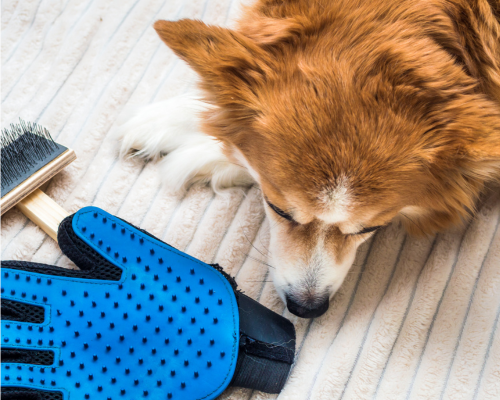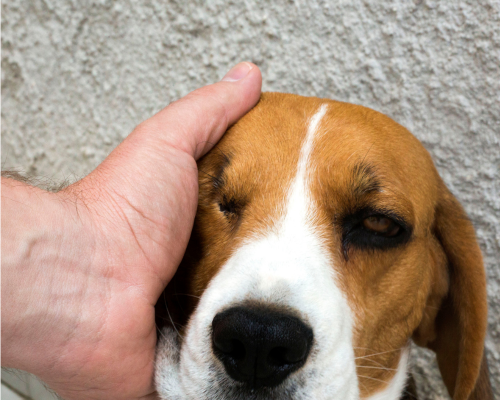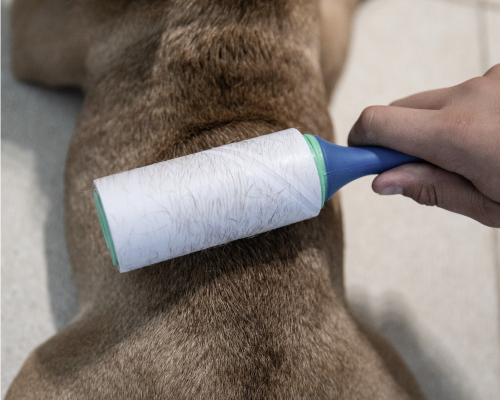Why Has My Dog Stopped Shedding? 6 Reasons!
Why Has My Dog Stopped Shedding? 6 Reasons!

Vet Reviewed

By: Sarah Hodgson
January 3, 2024
Table of Contents
You may have noticed a sudden change in your dog's shedding patterns. It's not uncommon for dogs to shed their fur regularly, but what does it mean when your dog has started to shed less or even stopped shedding completely?
In this article, we will explore six possible reasons why your dog has stopped shedding and what you should do about it.
Let's dive in!
Reasons Why Dog Has Stopped Shedding
It is possible for dogs to suddenly shed less or completely stop shedding. Why? Well, there are many reasons as to why. Below we'll go over the 6 possible reasons why your dog stopped shedding.
1. Seasonal Shedding
One of the most common reasons why your dog has stopped shedding is seasonal changes. Dogs, just like humans, have different shedding patterns throughout the year. Some breeds shed more during the warmer months while others shed more during the colder months. If your dog has stopped shedding, it could simply be because they are not in their shedding season.
During the shedding season, dogs typically shed their old fur to make way for new growth. This helps them regulate their body temperature and adapt to the changing weather conditions. If your dog's shedding has stopped, it could be a sign that they are not experiencing the usual seasonal changes.
2. Breed Has Minimal Shedding
Another reason why your dog may have stopped shedding is that they belong to a breed with minimal shedding. Some dog breeds, such as Poodles and Bichon Frises, have hair that grows continuously instead of shedding regularly. This means that their fur does not go through the same shedding cycles as other breeds.
If your dog is from a breed that is known for minimal shedding, it's likely that their lack of shedding is completely normal. However, it's important to note that even these breeds may experience some shedding due to other factors, such as health issues or environmental changes.

3. Spending More Time Outside
If your dog has recently started spending more time outdoors, it could be a reason why they have stopped shedding. Spending time outside exposes your dog to natural elements like sunlight and fresh air, which can have an impact on their shedding patterns. Sunlight, in particular, can help regulate your dog's melatonin levels, which in turn affects their hair growth and shedding.
Additionally, spending more time outside can lead to increased physical activity, which promotes overall better health for your dog. Regular exercise and fresh air can improve their immune system and promote a healthier coat. So, if your dog has stopped shedding due to increased outdoor activities, it's likely a positive sign that they are enjoying a healthier lifestyle.
4. Health Changes
Sometimes, a sudden change in your dog's shedding patterns can be an indication of an underlying health issue. Various health conditions, such as hormonal imbalances, allergies, or skin infections, can affect a dog's normal shedding process. If your dog has stopped shedding and you notice other signs of discomfort, such as itching, redness, or hair loss, it's important to consult with your veterinarian.
5. Dog Is Healthier
On a positive note, your dog's lack of shedding could be a sign that they are in excellent health condition. When dogs are healthy, their coat tends to be strong, shiny, and less prone to shedding. A balanced diet, regular exercise (being outdoors which we mentioned earlier), and proper grooming can contribute to a healthier coat and reduced shedding.
If your dog has recently undergone a positive change in their lifestyle or diet, their improved health may be the reason behind the decreased shedding.
6. Their Age
Lastly, age can also play a role in your dog's shedding patterns. Just like humans, dogs go through different life stages that can affect their fur growth and shedding. Puppies, for example, may have a different shedding pattern than adult dogs. Similarly, older dogs may experience changes in their fur due to aging.
If your dog has stopped shedding and they are either very young or quite old, it could be a normal part of their life stage.
What to Do if My Dog Has Stopped Shedding?
If your dog has stopped shedding and there are no health concern symptoms showing with it. Enjoy it! There's nothing to do.
You should enjoy it while it lasts. Continue to provide your dog with a balanced diet, regular exercise, and proper grooming. This will help promote a healthy coat and overall well-being.
However, if there are other symptoms showing, it's always best to consult with your veterinarian. They will be able to assess your dog's overall health and provide guidance specific to your furry friend.
Note
Remember, every dog is different, and some may naturally shed more or less than others. As long as your dog is otherwise healthy and happy, their lack of shedding may not be a cause for concern.

Should I Be Worried If My Dog Has Stopped Shedding?
While it's natural to be concerned when your dog's shedding patterns change, it's not always a cause for worry. As mentioned earlier, there are several reasons why your dog may have stopped shedding, and many of them are completely normal. However, if you notice any other concerning symptoms or changes in behavior, it's important to consult with your veterinarian.
Your veterinarian will be able to determine whether your dog's lack of shedding is a normal variation or if it requires further investigation. It's always better to address any potential health issues early on to ensure the well-being of your dog.
Can Dogs Stop Shedding as They Get Older?
Yes, dogs can stop shedding as they get older. Aging can bring about changes in a dog's fur, including a decrease in shedding. Older dogs may have a slower hair growth cycle, resulting in less shedding.
If your dog has stopped shedding and they are in their senior years, it could be a normal part of the aging process. However, it's always a good idea to consult with your veterinarian to rule out any underlying health issues.
The Bottom Line
So there you have it, if you've noticed that your dog has stopped shedding, it's important to understand the possible reasons behind this change. While it can be a cause for concern, it's not always indicative of a health issue.
If you are unsure about the cause, it's best to consult with your veterinarian. Always be on the safe side.

Subscribe to Petfluence!
Get updates on the latest posts and more from Petfluence straight to your inbox.